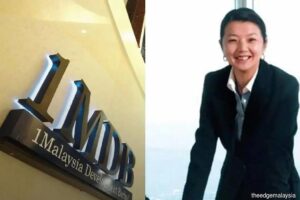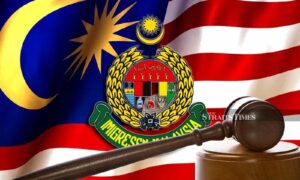By Fahri Azzat | LoyarBurok
On 3 April 2005, Mr Edmund Bon Tai Soon was alone driving himself home after having a few drinks. He was stopped at approximately 2:15 a.m. on Jalan Ampang, coming from Jalan Sultan Ismail and heading towards Jalan Leboh Ampang, by Corporal Zulkifli b. Mohd, who directed Lance Corporal Ahmad Ridzuwan to carry out a breathalyser test on Mr Edmund Bon.
A device known as the VAS II bearing Serial No. 35380 was used. Mr Edmund Bon blew into the device and soon after it gave a reading of 95mg of alcohol per 100 mililitres of blood (95mg/100ml), which exceeded the maximum allowed which is 80mg/100ml.
After the reading, the Lance Corporal was directed to escort Mr Edmund Bon to the Traffic Police Headquarters at the Tun HS Lee police station for further action. In doing so, the Lance Corporal demonstrated outstanding mindfulness in allowing Mr Edmund Bon, who at the time according to that device was over the limit, to drive the car there while he sat in the passenger seat. They arrived at the police station safe and sound 20 minutes later.
Sergeant Major Zulkepli bin Ibrahim took over from there as he was certified to use the Lion Alcolmeter EBA MA026 (EVA) (the Alcolmeter), a device to measure the alcohol content in the blood. He administered the Alcolmeter on Mr Edmund Bon after allowing him a rest of 20 minutes without any drink, food, or cigarettes. At 3:03 am, the Alcolmeter indicated that his alcohol level was even higher, 143mg/100ml on the first try. The second try failed because it took too long. Thereafter he was charged.
Though I have reproduced some choice bits of the judgment here, I encourage reading the judgment in full (in particular the police actually) because the Magistrate considers the application of sections 45A, 45B, and RTA87 deeply, and for myself, there is little to disagree with his analysis:
Berkenaan penggunaan SD2 VAS II pula, bacaan positif daripada alat ini adalah untuk memberikan pihak polis satu alasan yang munasabah untuk mengarahkan OKT pergi ke balai polis untuk satu ujian pernafasan di bawah S.45C. Tiada peruntukan undang-undang yang memerlukan pihak polis mengarahkan OKT berjalan lurus atau berdiri dengan sebelah kaki. Pihak pembelaan ketika berhujahkan isu ini mungkin terpengaruh dengan kaedah yang dijalankan di negara lain. Bacaan SD2 VAS II juga tidak menjadi isu kerana OKT tidak dituduh dengan bacaan alat itu. Walaupun bacaannya berbeza dengan bacaan EBA, ianya tidak menjadi satu faktor yang memprejudiskan OKT kerana ketepatan SD2 VAS II tidak dibuktikan dalam kes ini. Bacaan SD2 VAS II hanya digunakan sebagai kayu ukur kasar kandungan alkohol dalam darah OKT.
…
S.45C (2) tidak ada memperuntukkan bahawa polis perlu meminta daripada OKT satu spesimen nafas. Kehendak undang-undang adalah apabila satu spesimen nafas hendak diambil, ianya mesti diambil di balai polis. Pihak polis tidak perlu memohon ke OKT untuk dibawa ke balai polis dan untuk dapatkan kebenaran OKT.
…
Isu-isu yang berkenaan laporan tentuukur Sirim pula adalah tidak releven dengan kes ini kerana jika terdapat satu sijil kelayakan EBA, laporan itu tidak releven. Pihak pembelaan membangkitkan isu-isu seperti suhu 23 (darjah) Celcius bukan merupakan suhu badan dan titik perpuluhan pada kandungan Standard Ethanol Solution yang digunakan untuk proses tentuukur ialah 79.87mg/100ml dan bukan 80mg seperti yang diperunrukkan adalah tidak releven dan terlalu remeh. Saya menolak penghujahan pihak pembelaan kerana pihak pembelaan tidak mempersoalkan isu-isu ini ketika SP4 dan SP5 memberi keterangan. Dalam keterangan SP4 dan SP5, mereka menyatakan bahawa suhu badan adalah 34 (darjah) Celcius dan bukan 23 (darjah) Celcius seperti yang dihujahkan pihak pembelaan dan jika 79.87mg/100ml jika dibundarkan, bacaannya akan menjadi 80mg/100ml di mana ianya menepati kehendak undang-undang.
…
[After considering rule 5(4) and the Second Schedule of the Motor Vehicle Rules (Breath, Blood and Urine Test) 1995 Rules, the Magistrate said as follows:]
Saya berhenti sejenak untuk merumuskan kes pendakwaan pada tahap ini. Daripada OKT ditahan di lokasi kejadian, ujian hembusan SD 2 VAS II yang memberikan bacaan positif, pemanduan OKT ke balai trafik, ujian nafas EBA OKT yang menunjukkan bacaan 143mg alkohol/80 ml darah hingga ke pertuduhan OKT di bawah s.45A pihak pembelaan gagal menunjukkan sebarang kecelaan pada kes pendakwaan. Jika ini sahaja isu yang dipertikaikan, maka saya pasti akan memanggil OKT untuk membela diri kerana pihak pendakwaan telah berjaya membuktikan satu kes prima facie terhadap OKT.
…
Namun demikian, terdapat satu isu tunggal yang telah berjaya menimbulkan keraguan munasabah pada minda saya. Isunya adalah berkenaan Kaedah 3 KMM. Saya kemukakan Kaedah 3 di bawah:
Kaedah 3: Alat penganalisis nafas.
Alat penganalisis nafas yang hendak digunakan bagi maksud menjalankan ujian nafas di bawah seksyen 45C Akta hendaklah alat penganalisis nafas yang ditentukan oleh Menteri dari semasa ke semasa.
…
Pihak pembelaan menyatakan bahawa EBA yang digunakan hendaklah ditentukan oleh Menteri dari semasa ke samasa. Perkara ini tidak dibuktikan oleh pihak pendakwaan. Pihak pembelaan mengatakan Mahkamah tidak boleh menerima pakai EBA itu hanya kerana pihak polis trafik menggunakannya dari dahulu lagi, ia tidak bermakna bahawa ianya alat yang menurut ketetapan Menteri.
…
Pihak pendakwaan ada memohon Mahkamah menggunakan judicial notice untuk mengambil kira bahawa EBA adalah alat yang telah ditentukan oleh Menteri tetapi tiada warta kerajaan yang dikemukakan untuk Mahmakah mengambil judicial notice.
Atas isu ini, dan hanya isu ini sahaja, satu keraguan munasabah telah timbul di kes pendakwaan. Dalam erti kata lain, pihak pendakwaan telah berjaya membuktikan semua elemen-elemen s.45A dan telah menstrukturkan kes pendakwaan dalam satu longgokkan yang disimpulkan dengan satu tali. Tali itu, jika ikatannya cukup kuat akan memastikan prima facie pada kes pendakwaan dan OKT akan dipanggil untuk membela dirinya. Tali itu adalah alat EBA itu sendiri.
Malangnya, tali itu tidak diikat dengan ikatan yang cukup kukuh. Tiada bukti bahawa EBA itu adalah alat penganalisis nafas yang ditentukan oleh Menteri dari semasa ke semasa. Ikatan longgokkan kes pendakwaan terburai dan saya berpendapat bahawa pihak pendakwaan telah gagal membuktikan satu kes prima facie terhadap OKT.
[underlined parts by me]
So, in short, the prosecution had actually proven every element of the charge. The Magistrate would have called for Mr Edmund Bon’s, no doubt, scintillating defence. However, as the prosecution failed to address their mind to that terribly small but highly significant need to prove that the Alcolmeter was a device directed by the Minister for the use as a breathalyser and hence legal, the case was thrown out without the defence being called. The prosecution subsequently appealed the decision, but withdrew its appeal after receiving the grounds of judgment of the Court. So this case is well and truly over.
Clearly, the prosecution (and hence the Attorney General’s Chambers) lost because of an oversight on their part. They failed to ensure that the Alcolmeter was properly authorised for use by the Ministry. That they tried in futile to argue that the Court could take judicial notice of it was just desperate and indicates that they did not address their mind to this issue at all.
I wonder whether there are any post-mortem procedures in place in the Attorney General’s Chambers to ensure that they learn from their mistakes, especially where the case is thrown out without calling for the defence. The DPPs handling the case should be interviewed (and I know they will cuss me for saying this), and file a report to explain why it happened that way. Did the witness mess up on the stand? Did the police secure the exhibits properly? Did it relate to the admission of certain crucial evidence? Where did the trouble lie from their perspective? Where written judgments are delivered, it is helpful to see who and where exactly it went wrong from the Court’s perspective. Some of our judges are often quite helpful in advising the police on how they may have done it properly or pointed out areas for their consideration for development. I hope to see more of that. They need to be hounded on where they have gone wrong.
It amazes me sometimes how the police sometimes keep making the most elementary errors that have been documented and reprimanded upon in earlier cases. They are not learning from their mistakes. I’ve had a few like that. An example of this is in some of the drug cases that are reported. Upon receiving the tip they straightaway make a raid on the place without taking their time to observe the place for a couple of days at least. So sometimes they miss out on a charge on dealing drugs (which has a higher sentence than possession, and that is death) though they do get them on possession (section 6 of the Dangerous Drugs Act 1952 which metes out a fine of RM 20,000 or not exceeding 5 years, or both). Sometimes they just lose because they cannot prove exclusivity of the premise or custody or control of the drug container. I certainly wish they could do their job much better, less rashly for one.
The Attorney General’s Chambers should be targetting a 75% conviction rate for those tried prosecutions, and that excludes guilty pleas. I don’t know what the statistics are but if I have to judge from what is reported in the press they are not doing very well. And they should work towards 100% of at least getting the defence called even if they eventually lose because it indicates that at the very least they have demonstrated a prima facie case. They have to scrutinise and rigorously test their case before taking out a charge. However, to lose without even the defence being called suggests that the case is so frivolous or the evidence so lacking that the defence does not even have to be called. This should not be acceptable. It is a waste of taxpayers’ money, the DPPs’ and the lawyers’ time and effort, and the witnesses’ time and trauma. Most of all it is a waste of the Court’s time. If they want to get serious they should try and pull one or a few of those big boys of the criminal Bar over to sharpen their prosecution and help identify those weak spots and suggest measures to strengthen them. The amount of experience, skill, and learning they have is priceless.
Finally, I am pleased that the Magistrate troubled himself to reprimand the police for their Lance Corporal’s being taken in by the charming Mr Edmund Bon and allowing him to drive them to the police station when they had discovered that he was over the limit. Though Mr Edmund Bon is a friend of mine, I confess that the remarks made by the Magistrate directed at Mr Edmund Bon are not without merit too:
Dalam orbiter, saya ingin membuat teguran terhadap budi bicara anggota trafik yang membuat operasi di jalan. Contohnya dalam kes ini di mana SP3 telah membenarkan OKT memandu kenderaannya selepas disyaki dipengaruhi alkohol. Alasan mengapa SP3 membenarkan OKT untuk terus memandu adalah kerana OKT telah meminta dengan baik dan untuk mengelakkan pertelingkahan, SP3 termakan dengan pujukan OKT.
Saya merasakan ini sebagai satu penggunaan budi bicara yang melebihi kuasa. Membenarkan OKT untuk terus memandu selepas mengesyaki OKT di bawah pengaruh alkohol adalah salah dan amat membahayakan. Bahaya ini adalah kepada diri OKT sendiri yang tidak dapat dipastikan kestabilan mindanya kerana pengaruh alkohol, bahaya kepada SP3 yang menjadi penumpang OKT dan yang paling ketara, bahaya kepada pengguna-pengguna jalan yang lain. SP3 tidak sepatutnya membenarkan OKT memandu. Mengelakkan pertelingkahan bukan satu pilihan. Jika OKT berdegil atau berlawan, gunakanlah kuasa yang ada untuk menahan OKT.
OKT pula tidak sepatutnya meminta untuk terus mengawal kenderaannya selepas mengetahui bahawa bacaannya dengan SD2 VAS II adalah positif. Saya tidak meragukan keupayaan OKT dalam membuat pertimbangan ketika itu tetapi apabila mengetahui bahawa bacaan awalnya adalah positif, OKT tidak patut memohon SP3 untuk terus memandu. OKT sebagai seorang peguam dan pengamal undang-undang di Malaysia sepatutnya lebih arif daripada meminta sesuatu yang amat membahayakan seperti ini.
LoyarBurokker Edmund Bon Tai Soon was charged for driving under the influence of alcohol on 3 April 2005 at approximately at 2:15 a.m. on Jalan Ampang from Jalan Sultan Ismail heading towards Leboh Ampang vide Kuala Lumpur Criminal Magistrate Court Charge No. T1-P83-357-2005 pursuant to section 45A(1) the Road Transport Act 1987 (RTA87).
Fellow LoyarBurokker, Amer Hamzah Arshad, in his customary manner defended him and successfully persuaded the Magistrate, Tuan Syed Adam Alhabshi.
Another founding LoyarBurokker, Fahri Azzat, discusses the Magistrate’s decision and explains how close the Attorney General’s Chambers came to proving a prima facie case against Edmund Bon and having his defence called, and how they eventually lost it. Though this is merely a Magistrate’s decision, it is the first case in Malaysia in which sections 45A, 45B, and 45C RTA87 are considered at length. The full written judgment can be downloaded here.
Source: https://loyarburok.com/2009/07/27/loyarburok-1-attorney-generals-chambers-of-malaysia-0/. Archived at https://perma.cc/75R4-L4WH.



